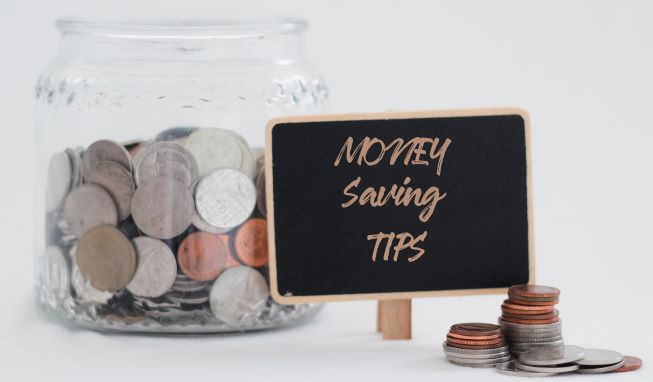Simple, everyday money saving tips
One of the first steps to save money comes from cutting expenses. This can give you the breathing room you need to get rid of debt and start saving.
Another crucial step is to ensure that you spend your money on things that bring you lasting value, and ensure that you give it some thought before making a purchase. Thinking about what you are buying and whether it will bring lasting value can eliminate many ad-hoc purchases that can waste money.
There are many areas of your daily life where you can make savings, such as food, bills, transport, entertainment and more. Here we outline some simple, everyday money saving tips that everyone can try for food, household essentials, clothing and entertainment. Next month we will discuss tips in relation to transport, bills and non-essentials.
Save money on food, beverages and household essentials
Grocery shop on a full stomach
You can buy more and often unnecessary items if you do your grocery shopping while hungry. So it’s often a healthier and cheaper option to eat before you hit the grocery shops!
Swap meat for veg
Generally speaking, meat is more expensive than vegetables (especially in-season vegetables). So try substituting a meat meal or two a week with vegetables and/or legumes. Even if you do not want to substitute your meat, you can make your meat meals go further by adding extra vegetables and/or legumes.
Buy frozen veggies
The frozen variety of vegetables, can often be cheaper than the fresh comparison. If stored properly, frozen veggies can also have a longer shelf life and reduce waste –. According to some studies, frozen vegetables can be just as nutritious as fresh vegetables.
Make your own coffee
If your morning ritual includes a takeaway coffee each day, this could be costing you over $1,000 a year. So making your own coffee from an at home coffee machine each day could definitely save you money, even if you need to invest in a coffee machine first.
Buy in bulk
Buying kitchen staples and non-perishable food in bulk can definitely save a lot of money over the long term – assuming you use them regularly and can store them. Buying in bulk is usually cheaper and often bulk items are discounted or on sale more often. These can include things like flours and sugars from a bulk food provider or toilet paper and dishwasher bulk packs on sale at the supermarket. Every little bit will help towards saving more.
Tip: pay attention to price per unit, not just the total price.
Buy home brands
Try the generic or home brands instead of the more expensive name brands. Often these work just as well and/or are made by the same supplier(s), just packaged differently. This can save you a lot on a grocery bill if you are a name brand buyer.
Grow your own
A very rewarding option to help cut your grocery bills is by growing your own fruits, vegetables and herbs. Packets of seeds are inexpensive and can lead to a healthy supply in several months. Just allow for any garden set-up costs, if you don’t have the garden already.
Reuse as much as possible
From gift wrapping to food containers and plastic bags, many items we have around the home can be reused to save on buying new. This will not only help you save money, but could help out the environment too.
Drink more water
Drinking water and less soda and juice, will save you money. Water is inexpensive, whereas juice and soda cost more. Not to mention, juice and soda can have long-term health consequences.
Make your own cleaning products
Cleaning products can be very expensive, however they are often easily made yourself using inexpensive products. Often you only need water, vinegar, salt, baking soda and essential oils and you can create many home cleaning products. Simply check online for cleaning product recipes such as detergents, disinfectants or stain removers. Ensure you do your research and be aware of which products SHOULDN’T be mixed together such as vinegar and bleach/hydrogen peroxide and which products should and shouldn’t be used on what surfaces such as never using vinegar on a marble surface.
Laundry powder
You only need to use half the recommended dose of washing powder to get a great wash. Don’t waste your money on fabric softener as it actually makes your towels less absorbent.
Use pump bottles
Most shampoo, conditioner and liquid soap bottles dispense far too much at a time, meaning most of it is wasted and needs to be purchased more regularly. Therefore, getting a pump bottle for each of these things in the shower and sinks will reduce your use and lower your costs.
Consider generic medications
If you take a name-brand medication, talk to your doctor and/or pharmacist to see if there is a generic version of that medication that can meet your needs. Generic medications can save you money on your prescription costs, especially over time.
Save money on clothing
Preloved clothing
Consider buying clothes from thrift or preloved stores. There are plenty of physical stores as well as online stores for preloved clothing. You never know what bargain you will find, and this will also help the environment.
Repair clothing
Instead of disposing of clothing that needs repairing, get out the needle and thread and fix a missing button or fraying hem. For bigger repairs even paying a clothes repairer can save you money overall. Making repairs will give your garment a lot more life and save the money of replacing it.
Shop online
Shopping online for items such as clothing can help you find the best prices and save you a lot of money over time. It’s worth the shopping around.
Save money on entertainment
Invite family and friends over
Often social events are out and about, which usually results in spending money on food, drinks or entertainment. Instead why not invite people over to your place, for coffee and cake, a movie night, a bring-a-plate dinner party, a games night, the ideas are endless and a lot cheaper than the going out alternative.
Skip fast food
When out and about and hungry, the option to buy fast food can be very tempting. However, it’s a much better idea to pack snacks or keep filling snacks in your car, rather than spend a lot more money on a quick fix full of calories that will leave you hungry again in a few more hours anyway!
This also applies to work lunches, pack your lunch from home to save you a lot of money each week and each year, instead of buying lunches.
Plan ahead when out for the day, by pre-purchasing or pre-making your snacks and meals. A pre-made pic-nic on a day trip is a lot cheaper than lunch bought at a convenience store or local café/restaurant. Keeping yourself out of convenience stores and fast food places will save a lot of money.
Attend free events
Entertainment can be very expensive. Check out your city and community websites and newspapers for free events in your area. This may include free concerts, festivals, celebrations, outdoor movies, community courses and so much more. Taking advantage of these free activities is fun and money saving.
Save money on transport
Use petrol apps
To find the cheapest petrol in your area, try using a petrol app. There are several available and will tell you which service stations currently have the lowest fuel prices.
Take public transportation
If you live in a city, you can save a lot of money on fuel, car wear and tear and car parking by using public transportation instead of driving.
Change your own cars oil and air filter
These simple car maintenance tasks can easily be done yourself with simple tools. Your car manual and/or YouTube will tell and show you everything you need to know to do this, saving you mechanic fees.
Car pool
If you work nearby your neighbours, family or friends, why not try car-pooling, taking it in turns to drive to work. This will cut down on petrol costs, vehicle wear and tear and is better for the environment.
Save money on bills and utilities
Home loan rate
It’s always worth a phone call to your bank to ask for a discount on your home loan interest rate. Australia has never before seen such low rates on home loans, so you never know what your bank will offer you. Otherwise you could shop around for a better deal elsewhere.
Shop around for your insurance
The cost of car and home insurances can vary quite significantly. It’s definitely worth shopping around for your best overall deal. Just be sure to check the relevant Product Disclosure Statement to make sure the products suit your needs.
Review your utilities
It could pay dividends to compare your energy or gas plan against what’s on offer on the market, to help ensure it’s competitive.
Become energy-wise
Becoming more energy-wise can see you make cuts in your utility bills. For example, turn off all power points at the wall when items are not in use, swap hot water washes for cold water, change your light bulbs to the more energy-efficient ones. Even things like checking the air seals in your home windows and doors, will prevent cool air from escaping your home in the summer and keeps warm air inside during the winter, reducing your heating and cooling costs.
Get your bills online
Some utility suppliers charge fees for paper statements. Therefore, going paperless and getting your statements online / emailed to you could save you a bit of money. There may also be exemptions from the paper statement fees, so it is worth checking this too.
Non-essentials
Use your local library
Save money on entertainment by borrowing instead of buying. Books, eBooks, magazines, audiobooks and DVDs are all available for free to enjoy at public libraries in Australia. Normally if you want to borrow items from your local library you will need to be a member, so take along your photo ID for proof of your identity and address, if you are not.
Propagate plants
Why buy new plants when you could propagate your own, for virtually no cost. You can also take some vegetables and replant the scraps/ends with roots instead of buying seedlings. These include sweet potatoes, potatoes, some herbs, leeks, spring onions and garlic. You can find online tutorials to learn more about this.
Swapping plants with your neighbours is another great way to expand your garden.
Stop collecting, and start selling.
Rather than accumulating more and more belongings, why not consider reducing your possessions, consider aiming for a small number of possessions that you really love and use. Start by selling off some of your unused stuff, you could even make some money.
Buy used
Whenever you’re considering buying non-perishable items such as furniture, appliances, fitness equipment and the like, consider looking for a used option first. There are many online options for people selling their unwanted goods at bargain prices.
Cancel unused subscriptions and memberships
If you have any subscriptions or memberships that you don’t use, such as a magazine subscription, a gym membership or a streaming service, then save yourself the money by cancelling it. If you can’t recall any, a good way to check is by going through your bank or credit card statements.
Shop around online
As mentioned above with shopping online for the best price with clothing, the same applies to many purchases, such as holidays, hotel accommodation, flights and so much more. You can also sign up online to get discount codes and vouchers, all of which can help you save money.
Join your local ‘Buy Nothing’ group
The ‘Buy Nothing’ groups (on social media) are part of the Buy Nothing Project where local people post anything that they would like to give away, lend, or share among other locals. Also you can ask for anything you’d like to receive for free or borrow. This is a gifting economy, not a buy or sell and a great way to save money and also clear out your unwanted items yourself.
Other
Special entitlements
If you’re a pensioner or hold a Health Care Card or Seniors Card, make sure you find out what benefits you can get through your local, state and federal governments or businesses. You may be able to get concessions on transport, motor vehicle registrations, rates, utilities, medications and medical supplies, animal registrations, events and movie tickets. Don’t ever hesitate to ask a business or service if they offer a discount based on you having one of these cards.
Interested in similar articles? Why not check these out:
Ten tips for sticking to a budget on holiday
Ten hidden ways you’re wasting money in the kitchen
References:
www.canstar.com.au/savings-accounts/frugal-living-tips/
www.mumlyfe.com.au/readers-tell-us-their-best-money-saving-tips-for-families/











